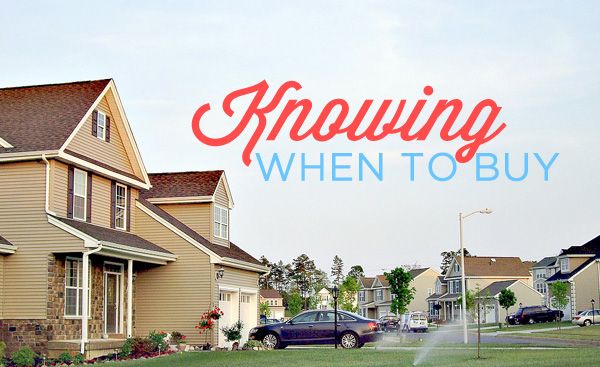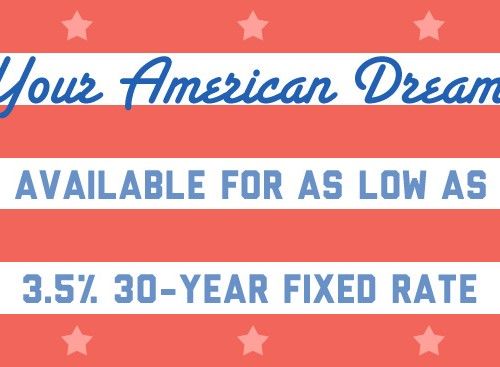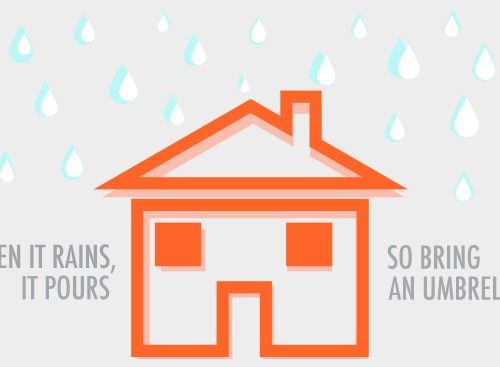Johnny and I find ourselves revisiting the buying vs. renting dilemma from time to time, and we’ve heard from some of you who are doing the same. Renting definitely has its perks, like not having to pay for a new dishwasher when ours suddenly breaks down. But Johnny and I would eventually like to be the reason a “Sold” sign goes up in a yard somewhere in this grand US of A. The trick is knowing when the time is right.
Johnny and I have compiled a little list of questions for ourselves, and when we can answer “Yes” to all of them, we’ll be ready to buy a home. I thought I’d share our list with all of you:
Do I have 20% to put toward a downpayment?
WHY: This is a number that Johnny and I feel comfortable with. If we can afford a 20% downpayment (and the monthly mortgage, of course), we’ll feel like our can-we-afford-it-o-meter is spot on. And if we put down 20%, we’ll also avoid paying private mortgage insurance (PMI). That said, 20% isn’t the magic number for everyone. If the interest rate and monthly payments are low, someone could put down 10% and be okay, too. As first-time home buyers, 20% will be more in our ballpark.
Will I be settled for at least the next 3 to 5 years?
WHY: Buying a home comes with a boatload of other expenses. And it would be difficult to turn a profit and build up equity if we moved just a year or two later. If we stay in a home for, say, five years, we’ll be able to get some decent equity up in there. We’ll also want to ensure that our cash flow is stable. The mortgage payments aren’t going anywhere, and so we’ll have to be certain our income isn’t either.
Am I otherwise debt free?
WHY: A home is a ginormous expense. And the expenses won’t stop once we buy the house, either. If our AC suddenly decides it’s not interested in keeping the house cool, we’ll have a hefty bill on our hands. Which would be very uncool. If at all possible, we’d like to have as few other monthly financial obligations as possible. Sometimes student loans, car loans, and other debts are the reality, and in those cases, it’s just important to make sure those are on the path to being paid off. Not having any other debt will also help us with securing a loan from the bank.
Do I have a six-month emergency fund in place?
WHY: Once we buy a home, we’re gonna go ahead and assume that what can go wrong, will go wrong. Emergencies will arise; appliances will break; sprinklers will go rogue. And an emergency fund won’t only be a nice cushion, it will also be a necessary cushion. The last thing we would want to have happen is to buy a house and then realize we can’t afford the unexpected problems that arise. And despite being *certain* we have a steady income before buying a home, nothing is certain. Fun, right? So an emergency fund would come in handy if we had any hiccups with our income as well. (Here’s how we calculated our emergency fund.)
Obviously, there are other considerations, such as the area where you buy, the current housing market, credit score, and so forth. No one really knows how the market will react over time, so buying is always a risk in a sense, especially if it’s not your forever home. But if we can answer “yes” to the questions above, chances are we’ll be a-okay. Everyone’s circumstances are different, and if you’re wanting to buy a house, you’ve gotta figure out what would make you feel ready. But if you can answer “yes” to the questions above, you may be ready, too :).
Any other questions/thoughts you’d add to this list? Any questions in general? Please share!
———————-
photo by LancerE





27 Comments
I notice that too often people do not have a six-month emergency fund prepared. It’s great that you guys would incorporate that in your list. It’s so easy for people think that once you buy a house everything will all be peachy keen till then. One thing I consider similar to the down payment is the closing costs, home inspection, and application costs. That stuff can easily add up to another couple thousand!
Good call, Dave! Those are great factors to have money set aside for as well. Johnny and I have a lot to save up for!
Thank you for this! I’ve been so wary of buying a house, but this is putting me at ease. Our first home back in our home state of AZ will be officially sold on Friday. We were fortunate and bought during the recession. However, a year after we bought the house, it went down $15k in value. Thankfully, the market has rebounded, and we are making a hefty profit. The profit will be what is allowing us to buy in Austin where the market is more than insane.. It will allow us to put 20% down, pay off our car loan, and keep a fair amount (at least 6 months if not far more) into savings. My concern has been with the market here since it is so high. However, with my hubby’s job as a firefighter, he’s set in his career for the next 20+ years, and I really want to find a house we can live in for that amount of time. I still somewhat prefer renting for the fact that I don’t have to worry about major stuff, but at least it will be about 30+% cheaper than renting. If we rented a similar house to what we are looking at it, it would be $1400+/month v. a mortgage which will be anywhere from $1100-1300 with taxes and insurance (taxes are super high due to no state tax). Thanks for giving me some parameters to look at–it gives me a lot of comfort!
Glad we could help, Megyn! It sounds like you guys are doing a great job of weighing the pros and cons of buying again. Good luck with the decision-making process!
Great conservative questions to ask! Something I wish we would have done. We had no idea what we were doing when we bought our home 7 years ago, and I can tell you, had we known to ask these types of questions before hand, it would have changed our decision.
I really like the “3-5 year” question. You would likely be stuck trying to sell before then, or would lose money. We wanted to sell before our daughter was born, but it was the absolute wrong timing. We would have had to sell for a loss of $30,000 from what we paid! Bad news.
I wish Johnny and I were a tad more spontaneous. Sometimes I wonder if we’ll ever have the nerve to pull the trigger on buying a home! 🙂
I think once you’ve answered yes to your questions, you might feel more ready. Knowing that you’ve take the precautions that most others (myself included) haven’t should be comforting. 😉
These are all great “to=do” steps before buying a house. I’m constantly going back and forth between, “Do we stick it out and wait a couple/few more years?” or “Jump into the market now.” Unfortunately, we live in a very costly state which means we just don’t have the 20% available yet (saving $80K is hard!) The other option is to think very long term and just wait it out until we can move some place much cheaper.
We go back and forth all the time, too! Whatever you end up deciding, good luck!
That’s a great financial plan! I commend you for thinking of this ahead of time and preparing for it. 20% down payment is crucial in my opinion and will help you both feel comfortable in your new home and afford the mortgage payments.
One word of caution about your 3-5 year plan. I think the 5-year threshold is a good one for stability and re-cooping your costs associated with a home (closing costs, maintenance, etc). However, on my current mortgage, in 5 years from inception, I will have paid down only 9% of the balance – not a significant portion of equity. It’s more important to consider which area you will be living in and how the market reacts in that area. If its an area with great schools and good family reputation (just a few examples), then the market will be less elastic and property values will be more likely to go up. For me, while handling the financial stuff is very important, evaluating the qualitative factors can have a greater impact.
Great tips, Richard. The market is a huge consideration. Thanks for sharing!
My fiance and I are starting to talk about buying a place, even though we’re a few years away from that. I definitely want to have 20% to put down, which probably means at least $90k around here! Gotta get busy saving!
For real. We don’t even live in a very expensive area, but we’re looking at $70k at least!
Great list! 3 years seems like a bit short on the timeframe, and even at 5 the equity built isn’t significant unless you are paying extra on the principal each month, but it tends to be long enough that the costs of buying and selling (closing, home inspection, realtor fees, etc) get to be worth it over renting for the same time frame.
I always thought I’d put 20% down on a house, but we ended up doing 10% to get into the market sooner here- prices had started going back up which was a factor (and why we didn’t buy a less expensive house- too much competition), but the biggest thing was securing a low interest rate. PMI will fall off in a few years (and I’m putting extra on it to get that gone faster), but that 3.375% rate is mine for the life of the loan.
That’s great you guys were able to put down 10% and get a good price and interest rate! With the market the way it is, people like Suze Orman who normally always suggest 20% are saying 10% can be okay, too. Sounds like it was the right choice for you guys :).
Being a grown-up is so hard sometimes! I found buying and owning a house to be more intimidating and stressful than parenthood!
We lucked out with our first house which we bought 10 years ago, We put just 3% down, unexpectedly moved three years later due to a job transfer and managed to make a profit. We never had any problems with the house either as everything was done right before me moved in. We put that profit into our next house, putting 10% down on something cheaper (and avoided PMI by taking out a HELOC for the remaining 10%). We stayed there for 6 yrs and…..lost that 10%, plus the $10K we put into a much needed bathroom renovation (not to mention all the other work we did) as we had to sell the house for less than we bought it. So now we are back to renting and stressing over when we can buy again. It sucks to start over at our age (I’m 39, my husband is 40). It will take us a long time to save up the 20% downpayment, and in the meantime, we’ll have to watch house prices and interest rates go up.
We have friends who are looking to buy their first home, and are reluctant to put 20% down. The house they want has only had one owner since it was built 10 years ago, and it is listed at the same price as the original purchase. They don’t want to run the risk of losing that money, just like the seller.
It’s tough… no matter how foolproof we think our plans are, home buying and selling is always a bit risky. If you know you’re going to be settled for a while, you might consider 10% so you can lock in a low interest rate. Either way, kudos to you for pushing hard to do it the right way, even if it might be a little while before you buy again. Good luck!
What an awesome list you got here! We’re definitely of the same mindset if we ever pull the trigger and purchase a house (for now, we’re OK going the rental way, and keeping our down payment in the bank)
The hubs and I have talked about setting aside an emergency mortgage account as well – perhaps with about 2-3 months worth of mortgage payments in a separate investment account. It’s a bit of a fail-safe for us, apart from our emergency fund. While we may never need it, we would at least have Plan C in place. Additionally, whatever interest we can generate from that, we can add that little by little to the mortgage that we do pay off.
Great idea! It’s never a bad idea to have a Plan C! And it’s always nice to have a little extra money earning some interest :).
Great list of questions. We’re often too focused on the goal of getting into a home we don’t take the time to assess of its really affordable.
True that.
Hi guys!
Well, having owned a few houses over the years, besides having a down payment, you might also want to plan to have money set aside for the following:
a house inspection (before putting down your offer to purchase)
house taxes
house insurance (fire, theft, weather, etc)
ongoing house / property maintenance expenses
utilities
moving expenses
plus:
a reasonable buffer of savings toward other unforeseen miscellaneous expenses
and –
because Johnny will now be the principle bread-winner in the family for some time,
dude, you might wish to consider taking out some income disability insurance, in addition to whatever life insurance that you already might have. Just a suggestion …
All great points, Rob. Buying a home is such a beast! So much to think about!!
And great suggestion. We’ll look into that!
With a big move in less than a year and the uncertainity of it and our careers, we know that we have a long ways to go before we buy a house, but the “I want to buy a house” bug gets me every once in a while, but when these factors pop in my head every time that bug gets me.
Same here, Sabrina! Sometimes I just want a house NOW!!
I think we only hit one of your points. I always said I’d put 20% down after I paid off my student loans, but it just didn’t work out that way. We saw a house that looked perfect for us and we just jumped all over it. Partially because of the price ($50-75k lower than I thought we’d end up at), partially because of low interest rates (3.25%) and partially because we’re special, unique snowflakes looking for something fairly specific and this property would actually work. So we pulled a 5% down payment + closing costs out of general savings and bought the place. Based on the appraisal, we had 16% equity on closing day. We’ve been dealing with some deferred maintenance and improvements we’d be making anyway, and market permitting, I’m hoping to drop PMI by the end of our 2nd year in the house. Definitely an unconventional way to get to 20% equity, but it’s working for us. Helps to buy something with a lot of unrecognized potential for significantly under your means with a solid financial footing though.
Sounds like you figured out something that worked for you guys! Even though Johnny and I have a set plan in place, if we found the perfect property that worked for us and we were ready to lay down roots, we might make an exception, too. Glad it’s going well!